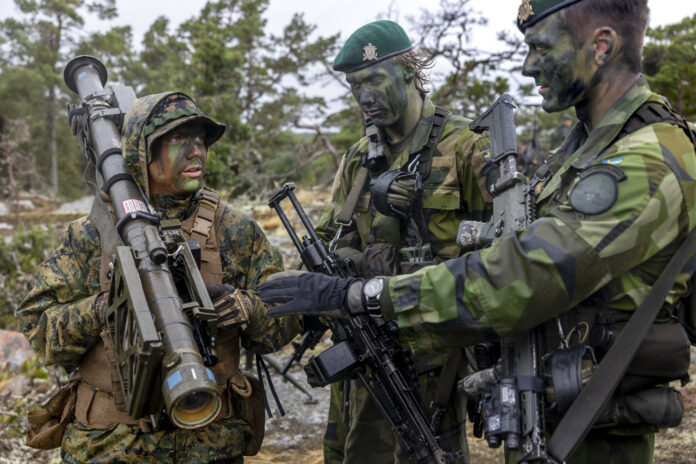Sweden—sat in the NATO waiting room until Hungary and Turkey drop their opposition to Stockholm’s accession—has committed to sending “ground combat units” to take part in alliance operations along the Russian border.
Prime Minister Ulf Kristersson said on Monday that Stockholm would not wait for ratification of its membership bid by the two rogue alliance parliaments in Ankara and Budapest, and would send Swedish troops to Latvia on NATO’s eastern frontier.
“Sweden and its neighbors are living in the direct shadow of Russia’s war of aggression against Ukraine,” Kristersson said. “But Russia’s threats, disinformation and cyberattacks are an attempt to destabilize the whole of Europe.”
“Last year, I announced that Sweden was—in addition to contributing to NATO’s Baltic Air Policing and cooperation to boost European air defense—ready to provide ground combat units to the defense of the Baltic countries. Today, I can report that the government intends to contribute a reduced battalion to the Canadian-led forces in Latvia.”
Jonas Gratzer/Getty Images
It is not yet clear how large or well-armed the Swedish contingent will be. Swedish daily Dagens Nyheter cited unnamed military sources who said the force would consist of some 800 soldiers supported by armored vehicles. Swedish Army Chief Jonny Lindfors previously told the newspaper the force could be deployed by early 2025.
Newsweek has contacted the Swedish Defense Ministry by email to request comment.
The Swedish force will join the Canadian-led Enhanced Forward Presence (EFP) battalion-sized battlegroup, one of four such formations based in Estonia, Latvia, Lithuania and Poland and intended as a first line of defense against any future Russian ground invasion of the Baltic states.
Latvian Defense Minister Andris Spruds welcomed Stockholm’s announcement. “We are pleased with this important decision, which, together with the upcoming admission of Sweden to NATO, will become a significant investment in strengthening regional security and the defense of Latvia,” he wrote on X, formerly known as Twitter.
The Canadian-led battlegroup currently includes contingents from Albania, Canada, Czech Republic, Iceland, Italy, Montenegro, Poland, Slovakia, Slovenia, and Spain. The total number of troops is around 4,000, with the force headquartered at the Ādaži military camp, close to the capital Riga and some 125 miles from the Russian border.
NATO nations have been working to expand the size and capabilities of the battlegroups since Russia’s full-scale invasion of Ukraine in February 2022.
The alliance has also abandoned its “tripwire” concept, which initially envisaged the EFP units as a lightly armed early warning system that would likely be overwhelmed by Russian forces. Instead, NATO leaders say they now intend to contest “every inch” of alliance territory.
Sweden is still waiting to become the thirty-second member of NATO, its accession having been stalled by bilateral tensions with Turkey. The Hungarian parliament is also delaying ratification of Stockholm’s bid, though Prime Minister Viktor Orbán is expected to fall in line soon after Turkish President Recep Tayyip Erdoğan drops his opposition.
Sweden and Finland both began the process of joining NATO following Russia’s invasion of Ukraine. For Sweden that meant ending 200 years of neutrality, though Stockholm has long coordinated closely with NATO, is a European Union member, and has been involved in several foreign military operations including the Afghanistan War, NATO-led peacekeeping following the Bosnia War, and the alliance intervention in the Libyan Civil War.
Kristersson said on Monday that his government is increasing defense spending by some $2.6 billion to reach the NATO spending target of 2 percent of GDP. “Defense expenditure will have doubled between 2020 and 2024, and with greater resources comes a greater responsibility to use them effectively,” the prime minister said. “Defending Sweden in war is our defining task.”
Russian leaders have repeatedly threatened both Finland and Sweden over their pivot to NATO membership. “We don’t have problems with Sweden and Finland like we do with Ukraine,” President Vladimir Putin said last summer. “If Finland and Sweden wish to, they can join. That’s up to them. They can join whatever they want.”
However, he added that “if military contingents and military infrastructure were deployed there, we would be obliged to respond symmetrically and raise the same threats for those territories where threats have arisen for us.”
Uncommon Knowledge
Newsweek is committed to challenging conventional wisdom and finding connections in the search for common ground.
Newsweek is committed to challenging conventional wisdom and finding connections in the search for common ground.


